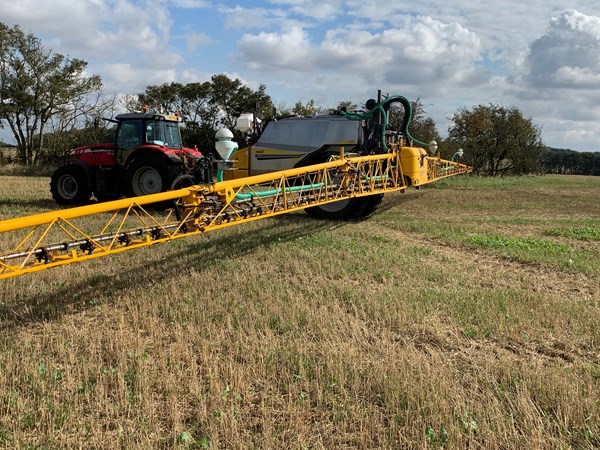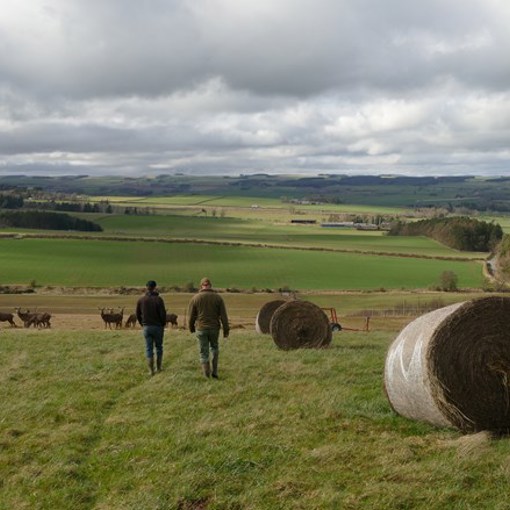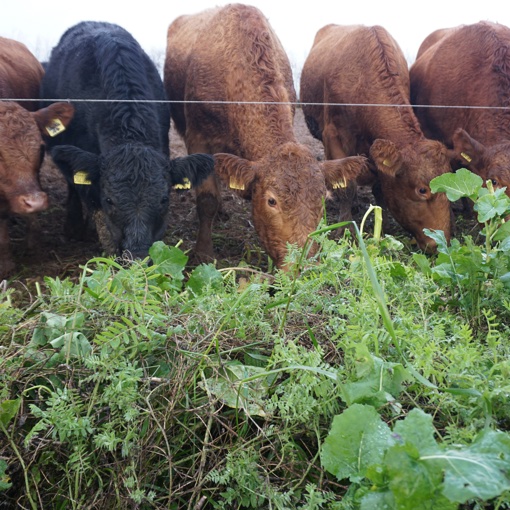The trial will investigate whether catch crops can deliver the same benefits for soil health as cover crops in a much shorter time frame. Together with Anglian Water and researchers at Lincoln University the farmer-led trial will assess the impacts of different seed mixes on soil health, cash crop yields, water retention and weeds, compared to leaving land bare or using a standard cover crop.
Overcoming harvest pressures
Many farmers encounter difficulties establishing catch crops and are forced to leave their land bare due to a lack of specialised equipment and significant time pressures during harvest. It is hoped that this new method may help farmers to overcome these challenges by enabling them to sow cover crops before the busy season, and therefore protect their soils in the gap that often occurs before they sow their next cash crops in the autumn.
Triallist and arable farmer, Alex Jasinski, has adapted a sprayer to sow the catch crops directly into his standing crop of vining peas prior to harvest. He will be terminating the catch crops at the end of October, with updates in January and final results expected in July next year. It is hoped that the method will reduce tillage and inputs and improve soil health by reducing soil erosion, improving soil structure, supressing weeds and encouraging beneficial insects. It is also hoped that the practice will reduce runoff and nitrogen leaching into water courses, which could help water companies like Anglian Water protect rivers from pollution.

Farmer perspective
Trialist and arable farmer, Alex Jasinski, runs a 1000 acre farm near Grantham, Lincolnshire, with a variety of crops including winter wheat, oil seed rape, vining peas and spring oats.
He said “We’ve been direct drilling for around ten years but because we’re farming around 1000 acres and I’m mainly on my own I’ve been thinking about how we can save time. That’s why I’m sowing the catch crop into a standing crop – so that we can get it in early enough to get it established before sowing a winter crop. We have added a techneat outcast spreader system to the booms of the chafer 36m sprayer to apply the catch crops. Catch crops deliver lots of benefits – and the more nitrogen we can hold in a catch crop the better it is for the following cash crop, the environment and local water sources too. Plus, using the sprayer is a quick, easy and cost-effective way to sow the catch crop using very little fuel.
We’re constantly trialing different techniques to see what works best for the farm but we’re never able to get the scientific confirmation of what we’re seeing. I’m really looking forward to having the figures in black and white and working with the researchers to find out more about the impacts of catch crops on nitrogen, soil health and water quality. Carrying out this research on real farms – at farm scale – means we can test what works and what doesn’t in real farm conditions. I’m not the only one running this setup on a sprayer so this research will be really useful to other farmers too.”
Vital on farm innovation
Kate Pressland, Innovative Farmers Programme Manager, said “Catch crops – fast growing crops grown between successive main crops – are a fantastic way to support healthy soils and crops by protecting soil from erosion during the months when it would normally be left bare, or using a gap between spring cropping and autumn sowing to build fertility, improve soil structure and weed suppression. However, it’s often a big challenge for farmers to establish catch crops when they might not have the right equipment, are under serious time pressure during the year, or when they want to reduce their tillage overall. That’s why we’re really excited to test this novel method of sowing cover crops designed by farmers to learn more about which seed mixes work best and the benefits catch crops can deliver for soil health, local water sources and the farm business.
Farmer led research is vital to understanding the benefits of healthy soils and the public goods sustainable farming can deliver for the wider environment. This approach means farmers can work directly with water companies like Anglian Water to find win-win solutions that protect the soil on their farm as well as the local waterways.”
Get involved in your own farmer-led research
To keep informed of how this field lab and others are progressing sign up to our newsletter below.
Related news

08 June 2021
Plant breeding for low input farms
Organic and low input farmers disadvantaged by current wheat breeding system

14 April 2023
Pasture resilience
Cost savings and boost for nature in new winter mob grazing trials

10 August 2022
Home grown fertility